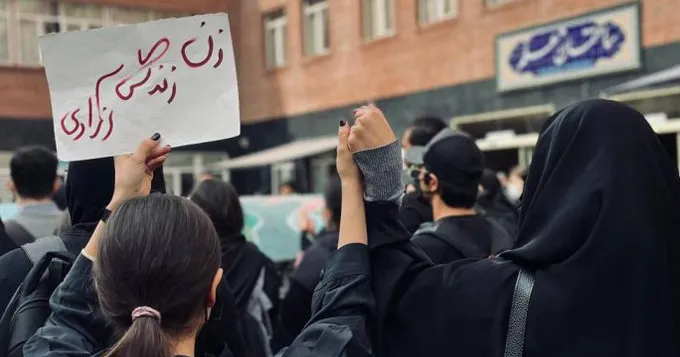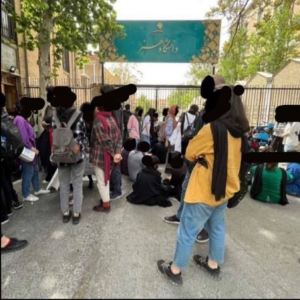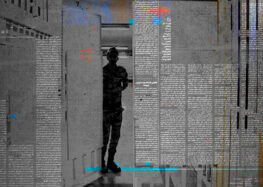Students Across Iran Say “No” to Forced Hijab

An undated photo captures a protest at the Art University of Tehran. Their shared message is powerfully displayed on a sign that reads, “Women: Life, Freedom.”
University Groups Support Persecuted Students at Tehran’s Art University
“Woman Life Freedom” Movement Continues Despite Detainments, Bans from Campus
June 19, 2023 – At least a dozen student groups from universities across Iran have issued strong statements of support for fellow students who are facing severe persecution at the Art University of Tehran for peacefully protesting forced-hijab rules and punishments on campus.
“University students at the Art University and across Iran are being jailed, banned and flunked for peacefully protesting repressive and discriminatory forced hijab rules,” said Hadi Ghaemi, executive director of the Center for Human Rights in Iran (CHRI).
“Governments should intensify diplomatic pressure on the Iranian government for its violations of freedom of expression and the right to peaceful protest,” Ghaemi said, “and academic organizations worldwide should stand in solidarity with Iranian students and amplify their calls.”
State security forces including plainclothes agents detained more than 10 students who were engaging in a peaceful sit-in at the Art University’s National Garden campus and forced them into a van on June 17. Several students were held for hours.
Some of them are first-year students from other provinces who are so new to the city that they didn’t even know how to get back after they were released, according to information received by CHRI.
According to research by CHRI, at least 720 university students have been arbitrarily detained in Iran since major anti-state protests erupted there in September 2022 in response to the death in state custody of Mahsa Jina Amini, 22, who was arrested for her allegedly improper hijab.
On June 19, 2023, the Persian hashtag #نه (No) was trending among Iranians on Twitter in a show of solidarity with the students, and more than a dozen student groups from more than a dozen Iranian universities had issued statements of solidarity.
Students Vow to Continue “Freedom” Protests

State security forces rounded up students engaging in a peaceful sit-in at the Art University of Tehran on June 17, 2023.
After the students’ peaceful sit-in at the Art University’s National Garden campus was attacked by state security agents on June 17, a group of students at the university issued a powerful statement.
“…We, who have become ‘us’ for almost a year now, have nothing to say to you except the word No,” said the statement published that day.
“After your renewed emphasis on gender apartheid and the obligation to attend the university in a maqnaeh (headdress), after shutting off the water and using violence against our friends who were only staging a sit-in for equality in the National Garden Campus, we reiterate that we will not turn back,” it added.
“This sky is still full of stars even after pulling some of them to the ground on a daily basis. The wound that opened wide in September (2022) is still bleeding. And we are standing, hand in hand, for freedom,” said the students.
Student Groups Around the Country Weigh In With Support
“The extreme and reckless security measures, and every blow to the body of the art students and students as a whole on a larger scale, impacts the academic community and directly results in angry responses,” said a statement by a student group at the Tehran University’s College of Fine Arts.
“The times when students submitted to oppression have come to an end,” said students at the Farabi Campus of Tehran University. “Every oppressive power’s fear has come true: Students can no longer be obedient sacrificial pawns, for they are inherently free-thinking and freedom-loving.”
“The Art University students’ protest against wrongful measures is nothing but the beautiful art of bravery, rejecting oppression and the oppressor, and a moral commitment to the high ideals of fighting injustice, and advocating justice and freedom,” added a student group at the Khajeh Nasir Toosi University’s Technical College.
Students and Young Women Across Iran Continue to Defy Hijab Laws
The Art University was the first university to publicly demonstrate against the death in state custody of Mahsa Jina Amini, which sparked months of nationwide protests that came to be known as Iran’s “Woman Life Freedom” movement.
As the number of women on campus opting to wear loose or no hijabs increased, university officials have responded by attempting to enforce mandatory wearing of the maqnaeh, a black cloth that covers their head, forehead, chin, and chest. This has further fueled the protests.
New compulsory hijab legislation is currently under deliberation in Iran’s parliament right now, which imposes strict punishments and the denial of essential services to women who do not comply with the country’s hijab laws.
This report was made possible from donations by readers like you. Help us continue our mission by making a tax-deductible donation.






